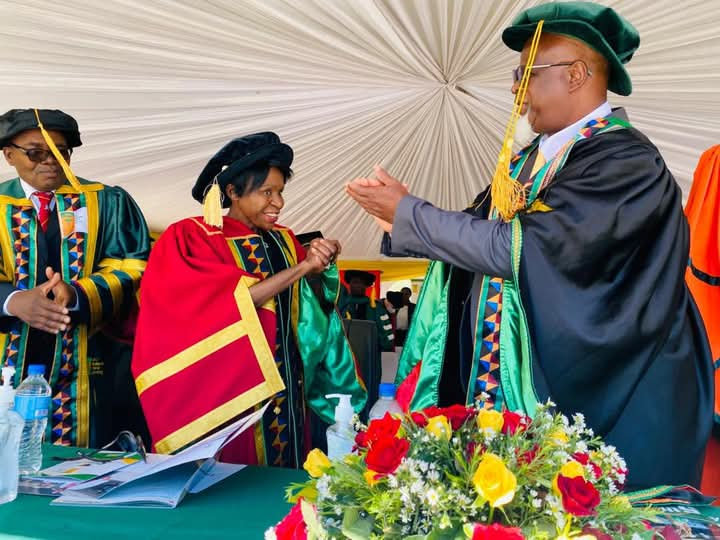CELEBRATING THE FUTURE OF HEALTHCARE: LMMU GRADUATES OVER 1,900 HEALTH PROFESSIONALS
Levy Mwanawasa Medical University (LMMU) reaffirmed its position as a leading institution in Zambia’s health education sector by hosting its 5th Graduation Ceremony on 8th May 2025. The event celebrated the successful training of over 1,900 health professionals, a landmark achievement not only for the graduates but for the entire nation.
Officiated by the Minister of Health, Dr. Elijah J. Muchima, the ceremony took place at LMMU’s main campus in Lusaka. In his keynote address, Dr. Muchima commended the graduates for their perseverance and dedication, describing them as the backbone of Zambia’s future healthcare system.
“You are now at the frontline of our healthcare system,” he said. “As you embark on your professional journey, carry with you empathy, professionalism, and a deep sense of duty to serve humanity.”
Dr. Muchima reiterated the New Dawn Government’s steadfast commitment to strengthening the health sector through strategic investments in human capital and infrastructure. He noted that since 2022, over 18,000 health workers have been recruited, with an additional 2,000 professionals expected to be hired in 2025.
He emphasized that these initiatives are aligned with Zambia’s Vision 2030, the Eighth National Development Plan, and the National Health Strategic Plan, all aimed at achieving Universal Health Coverage and building a resilient, inclusive health system.
The Minister also lauded Levy Mwanawasa Medical University for its outstanding contribution to the training of competent and innovative health professionals, underscoring the institution’s pivotal role in shaping the future of Zambia’s healthcare delivery.
“My Ministry remains committed to supporting educational frameworks that equip our health workers with the knowledge and skills needed to meet emerging health challenges,” Dr. Muchima added.
The ceremony was attended by several distinguished guests and senior officials, including:
• Former Minister of Health, Dr. Chitalu Chilufya, whose continued engagement in the sector reflects his ongoing commitment to national development;
• Professor Roma Chilengi, Director General of the Zambia National Public Health Institute (ZNPHI), a key figure in shaping public health policy;
• Professor Laston Chikoya, Deputy Vice-Chancellor for Administration at LMMU;
• Mr. Annel C. Bowa, University Registrar, who has overseen the academic journey of the graduating class;
• Directors from the Ministry of Health, representing critical departments involved in policy and service delivery; and
• The Provincial Medical Officer for Lusaka Province, a key stakeholder in regional health implementation.
The Minister also paid tribute to parents and guardians for their sacrifices, as well as the university’s faculty and staff for their tireless work in preparing the graduates for the demands of Zambia’s healthcare system.
“This ceremony is not just a celebration of academic achievement, it is a symbol of national progress and a call to action for all of us to continue building a health system that leaves no one behind.”
Speaking during the ceremony, LMMU Vice-Chancellor, Professor Elwyn Chomba, reaffirmed the university’s commitment to producing technically skilled, socially conscious graduates ready to serve across all corners of the nation.
Professor Chomba highlighted LMMU’s practical, comprehensive, and decentralized training model, which includes clinical rotations and hands-on experience in facilities across all ten provinces of Zambia.
“We are reviewing our curricula and redesigning our course content to ensure we meet both present and future health needs of the Zambian people,” she said.
She urged the graduates to uphold the values of professionalism, service, and excellence that define LMMU, and to make a lasting impact on healthcare in Zambia and beyond.
As the ceremony concluded, the atmosphere was filled with joy, pride, and a renewed sense of hope; proof of what can be achieved through vision, dedication, and a shared commitment to health equity.
Congratulations to the Class of 2024. You are the heartbeat of Zambia’s healthcare future.
The Levy Mwanawasa Medical University- SOMCS
By: Georgia M. Chimombo
PPRP/Spokesperson
Ministry of Health







OTHER ARTICLES
Editorial — Prevent, inform, and act for women’s health in Africa
Kenya : Government Prioritises Maternal Health and Strengthens Support for Community Health Promoters
Strengthening pandemic prevention, preparedness, and response capacities in Senegal using the “One Health” approach